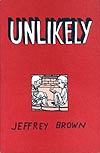
|
"Unlikely" (Top Shelf Productions; 228 pp.; $14.95) came out last year after Brown's well-received first novel, "Clumsy." Both books feature excruciating portraits of the author's failed relationships. The alternate title of "Unlikely," hidden on the back cover, is "How I Lost My Virginity." It tells the story of the late-blooming, sensitive Brown and his mid-twenties relationship with a young woman named Allisyn, who has considerably more sexual experience than he. Brown pulls apart the moments of his first real relationship into short flashes of a few pages. Some are the kind of low-key incidents that stay in our mind long after, like when he gives her a pair of his tube-socks. Other scenes are more dramatic. Each one has title, the only noticeable editorializing in the book. "Sure," for example, depicts Brown and his girlfriend Allisyn in bed, fully clothed, talking about having sex. "I'm sure," he says. "Are you," she asks. "I'm pretty sure," he says.
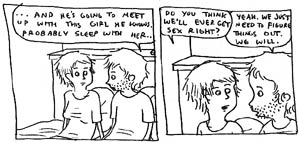 Allisyn and Jeff have a talk in "Unlikely"
Allisyn and Jeff have a talk in "Unlikely" |
Brown seemingly spares us nothing, from his difficulty achieving an orgasm to the careless way Allisyn distances herself from his affections. He works in a scratchy, unpolished drawing style that looks like something put down in haste right after the event. The rawness and immediacy may be illusory — even the most crudely crafted comix page takes time to organize and draw — but they make the actions seem more real. Call it comix verite. Similar to the work of such documentary filmmakers as Frederick Wiseman and the Maysles brothers, Brown eschews any sort of narration or insight into what the characters are thinking. Instead, Brown lets the humor and pathos speak for itself and allows us to more easily project ourselves onto the characters. This way, even though the story is deeply personal, it becomes completely compelling. Funny, sad, and a little embarrassing, Jeff Brown's "Unlikely," delivers the look at real life that other forms of "reality" entertainment falsely promise.
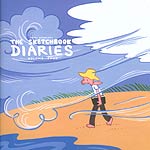
|
James Kochalka's "Sketchbook Diaries, Volume 4," (Top Shelf Productions; 48 pp.; $7.95) continues the annual series of books that collect a year's-worth of Kochalka's daily online strip. More like haikus than indulgent chronicles of the author's day, each strip consists of just four, or less, panels showcasing a singular moment. These can be banal (June 27, 2002: "Uncomfortably tossing and turning till my legs get twisted in and bound by the sheets") or funny (June 6: "I gagged while brushing my teeth expelling red wine, venison, fillet mignon and hand made sausagethe color scheme was actually kind of beautiful") Kochalka has a kind of childish charm — he draws himself as an elf with buck teeth and pointy ears — who finds magic in moments the rest of us would ignore.
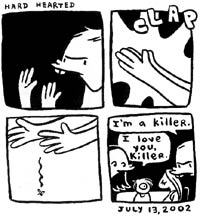 James the Fly-Killer in his "Sketchbook Diaries"
James the Fly-Killer in his "Sketchbook Diaries" |
This focus on the little things tends to lose site of the big picture, though. Over the course of his standing in the shower, not feeding the cat, falling off his bike, etc. we learn that Kochalka and his wife are trying to have a baby. Whatever sort of important discussions they may have had about this are only cursorily touched on in the "diary." Even the moment they learn she is pregnant goes unrecorded. We have to infer it from a strip about her morning sickness. But the delights of the book are in Kochalka's endearingly quirky personality and simple, but not uncrafted graphical style. We could take lessons from his focus on being in the moment.
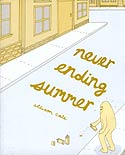
|
Allison Cole's "Never Ending Summer" (Alternative Comics; 48 pp.; $11.95), just released, marks her graphic novel debut. As is the DIY style, the author focuses on her own life and relationships, putting it onto paper with a beguiling simplicity. Set during a summer between semesters in Providence, Rhode Island, Allison works at a comic store and collects LPs. Asher, her boyfriend, has left for a two-week trip. Suddenly she gets a phone call. He wants to go back to Australia for the rest of the summer — where his old girlfriend lives. Uh oh. The rest of the book follows Allison's melancholy struggles with an increasingly irrevocable breakup. She spends a lot time drinking with her other besotted friends and their twisty, early-twenties-style relationships. To make things more confusing a guy named Sam comes on the scene and takes an interest in Allison. But he's still involved with his ex! Unlike Jeffrey Brown, however, Allison Cole comes up with an upbeat ending about relying on oneself to find happiness.
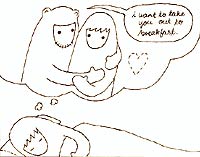 Allison dreams of better times in "Never Ending Summer"
Allison dreams of better times in "Never Ending Summer" |
Cole's artwork matches the unpretentious ambitions of the story. She draws her characters with an absolute minimum of detail. They are all essentially sexless blobs with singular attributes — glasses or animal ears — to distinguish between them. The polished grade-school style emphasizes the immaturity of the characters in a clever way. Everything is rendered as outlines, with no shading, like everyone is getting blasted with white light. Cole's relaxed, confident pace develops "Never Ending Summer" into a neat little view on the vulnerabilities of human interrelations.
We couldn't all do this, but such DIY-born books mean to make you believe you can. In their way they are much more inspiring than the high craft of Chris Ware's "Jimmy Corrigan" graphic novel. Books like Kochalka's, Brown's and Cole's find drama in the lives we all lead and present them as art with a minimum of fuss. "Why not at least try your own," they seem to say. Given the increased acceptance of such a style, you may even get published.
